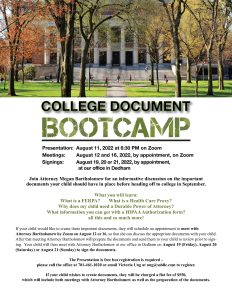When we discuss estate planning and what happens after you pass away, one of the most common inquiries we receive is “Why is it beneficial to have a Will in place before you die?” While it may be hard to consider what should happen to your assets after you pass away, having a valid Will prior to your death is essential for making sure your wishes and distribution instructions are clearly expressed and easy to follow.
As a reminder, a Will is a written document with instructions for distributing your probate assets after your death. Probate assets consist of tangible personal property, digital assets and devices, and real estate and other financial assets (such as bank and investment accounts) owned in your individual name for which there is no named beneficiary.
Probate is the process by which the Court appoints the Personal Representative (formerly called the Executor) you have named in a Will and grants that person the legal authority to take control of the probate assets, pay debts, expenses and taxes, and distribute the remaining assets according to the instructions in the Will. Creating a Will means that you control who will serve as your Personal Representative. Without a Will, any person ‘interested in your estate’ may ask the court to be appointed as the Personal Representative.
If you pass away without a Will (also known as dying “intestate”), Massachusetts state law determines who will receive your assets. In some cases, the way the law would distribute your assets is not the way you would want them to be distributed. Having a Will ensures your assets will be distributed to the people or charities you wish to benefit.
Establishing a Will as part of your estate plan is essential for controlling the distribution of your assets according to your wishes. Your Will allows you to name the Personal Representative in charge of administering your estate and provide clear instructions about how your assets should ultimately be distributed. To read more about why you should make a Will, as well as to find other articles on estate and long-term care planning, please visit other areas of our website or contact our office to schedule an appointment with one of our attorneys to create your estate plan!
